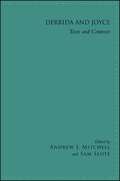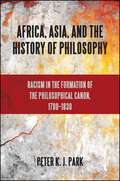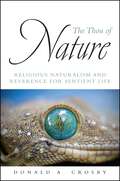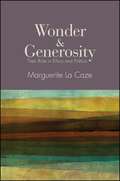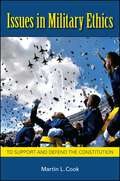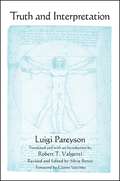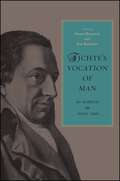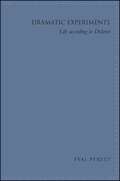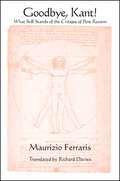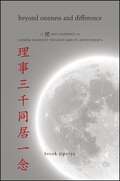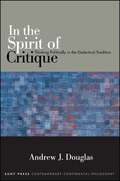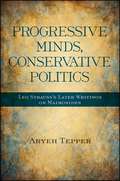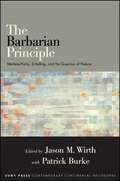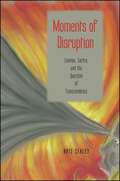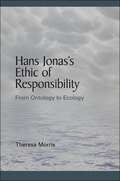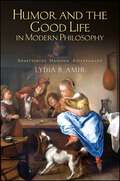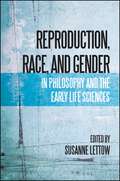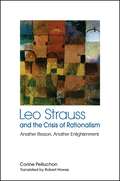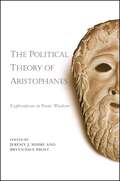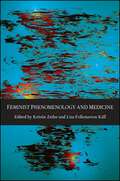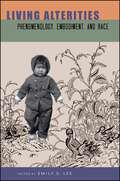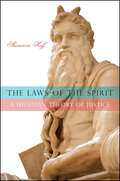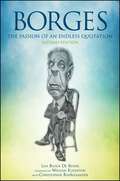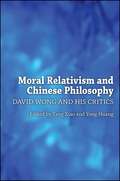- Table View
- List View
Derrida and Joyce: Texts and Contexts (SUNY series in Contemporary French Thought)
by Andrew J. Mitchell Sam SloteBringing together all of Jacques Derrida's writings on James Joyce, this volume includes the first complete translation of his book Ulysses Gramophone: Two Words for Joyce as well as the first translation of the essay "The Night Watch." In Ulysses Gramophone, Derrida provides some of his most thorough reflections on affirmation and the "yes," the signature, and the role of technological mediation in all of these areas. In "The Night Watch," Derrida pursues his ruminations on writing in an explicitly feminist direction, offering profound observations on the connection between writing and matricide. Accompanying these texts are nine essays by leading scholars from across the humanities addressing Derrida's treatments of Joyce throughout his work, and two remembrances of lectures devoted to Joyce that Derrida gave in 1982 and 1984. The volume concludes with photographs of Derrida from these two events.
Africa, Asia, and the History of Philosophy: Racism in the Formation of the Philosophical Canon, 1780–1830 (SUNY series, Philosophy and Race)
by Peter K. ParkWinner of the 2016 Frantz Fanon Prize for Outstanding Book in Caribbean Thought presented by the Caribbean Philosophical AssociationIn this provocative historiography, Peter K. J. Park provides a penetrating account of a crucial period in the development of philosophy as an academic discipline. During these decades, a number of European philosophers influenced by Immanuel Kant began to formulate the history of philosophy as a march of progress from the Greeks to Kant—a genealogy that supplanted existing accounts beginning in Egypt or Western Asia and at a time when European interest in Sanskrit and Persian literature was flourishing. Not without debate, these traditions were ultimately deemed outside the scope of philosophy and relegated to the study of religion. Park uncovers this debate and recounts the development of an exclusionary canon of philosophy in the decades of the late eighteenth and early nineteenth centuries. To what extent was this exclusion of Africa and Asia a result of the scientization of philosophy? To what extent was it a result of racism?This book includes the most extensive description available anywhere of Joseph-Marie de Gérando's Histoire comparée des systèmes de philosophie, Friedrich Schlegel's lectures on the history of philosophy, Friedrich Ast's and Thaddä Anselm Rixner's systematic integration of Africa and Asia into the history of philosophy, and the controversy between G. W. F. Hegel and the theologian August Tholuck over "pantheism."
The Thou of Nature: Religious Naturalism and Reverence for Sentient Life
by Donald A. CrosbyHumans share the earth with nonhuman animals who are also capable of conscious experience and awareness. Arguing that we should develop an I-thou, not an I-it, relationship with other sentient beings, Donald A. Crosby adds a new perspective to the current debates on human/animal relations and animal rights—that of religious naturalism. Religion of Nature holds that the natural world is the only world and that there is no supernatural animus or law behind it. From this vantage point, our fellow thous are entitled to more than merely moral treatment: protection and enhancement of their continuing well-being deserves to be a central focus of religious reverence, care, and commitment as well. A set of presumptive natural rights for nonhuman animals is proposed and conflicts in applying these rights are acknowledged and considered. A wide range of situations involving humans and nonhuman animals are discussed, including hunting and fishing; eating and wearing; circuses, rodeos, zoos, and aquariums; scientific experimentation; and the threats of human technology and population growth.
Wonder and Generosity: Their Role in Ethics and Politics
by Marguerite La CazeWonder and Generosity provides a fresh account of how the passions of wonder—based on accepting others' differences—and generosity—based on self-respect and mutual respect—can supplement each other to establish an ethics and politics of respect for sexual and cultural differences. Drawing on the work of both historical and contemporary thinkers, such as Descartes, Kant, Beauvoir, Arendt, Irigaray, and Derrida, Marguerite La Caze applies her theoretical framework to a range of contemporary political challenges, including asylum-seeker policies, justice for indigenous and other oppressed groups, debates over official apologies, gender equality, and responses to radical evil. La Caze's book contributes to understanding the relationship between equality and difference in public life, the extent to which we must regard others as similar in the name of equality, and the extent to which we must acknowledge significant differences.
Issues in Military Ethics: To Support and Defend the Constitution
by Martin L. CookReflecting on a seventeen-year career teaching at military educational institutions of the Air Force, the Army, and the Navy, Martin L. Cook finds a powerful but underappreciated basis for military ethics in the oath to the Constitution that members of the armed services pledge. In Issues in Military Ethics, Cook considers the role of airpower in counterinsurgency war and the place of robotic weapons systems on the battlefield, but he also looks beyond ethics in the conduct of war to issues arising in military life generally. He addresses a range of other issues with pressing contemporary relevance, including civil-military relations, ethics education, and religion, in particular the ascendency of evangelical Christianity in military culture. This volume serves as an important resource for scholars, members of the armed services, and educators alike.
Truth and Interpretation (SUNY series in Contemporary Italian Philosophy)
by Luigi PareysonLuigi Pareyson (1918–1991) was one of the most important Italian philosophers to emerge after World War II and stands shoulder to shoulder with fellow hermeneutic thinkers Hans-Georg Gadamer and Paul Ricoeur. The product of a well-developed theory of interpretation that stretches back to the late 1940s, his 1971 masterpiece Truth and Interpretation provides the historical impetus and theoretical framework for the questions of existence, art, and politics that would motivate his most famous students, Umberto Eco and Gianni Vattimo. In a time when the meaning of truth as an interpretation is challenged by the chaotic din of media on the one side and the violent force of absolute claims from science, religion, and political economy on the other, Pareyson's meditation on the value of thinking that is shaped by the traditions of philosophy and yet responds to contemporary demands remains timely and pressing more than forty years after its initial publication.
Fichte's Vocation of Man: New Interpretive and Critical Essays
by Daniel Breazeale; Tom RockmoreWritten for a general audience during a period of intense controversy in the German philosophical community, J. G. Fichte's short book The Vocation of Man (1800) is both an introduction to and a defense of his philosophical system, and is one of the best-known contributions to German Idealism. This collection of new essays reflects a wide and instructive variety of philosophical and hermeneutic approaches, which combine to cast new light upon Fichte's familiar text. The contributors highlight some of the overlooked complexities and implications of The Vocation of Man and situate it firmly within the intellectual context within which it was originally written, relating it to the positions of Kant, Hegel, Schelling, Schlegel, Jacobi, and others. In addition, the essays relate the text to issues of contemporary concern such as the limits of language, the character of rational agency, the problem of evil, the relation of theoretical knowledge to practical belief, and the dialectic of judgment.
Dramatic Experiments: Life according to Diderot (SUNY series in Contemporary French Thought)
by Eyal PeretzDramatic Experiments offers a comprehensive study of Denis Diderot, one of the key figures of European modernity. Diderot was a French Enlightenment philosopher, dramatist, art critic, and editor of the first major modern encyclopedia. He is known for having made lasting contributions to a number of fields, but his body of work is considered too dispersed and multiform to be unified. Eyal Peretz locates the unity of Diderot's thinking in his complication of two concepts in modern philosophy: drama and the image. Diderot's philosophical theater challenged the work of Plato and Aristotle, inaugurating a line of drama theorists that culminated in the twentieth century with Bertolt Brecht and Antonin Artaud. His interest in the artistic image turned him into the first great modern theorist of painting and perhaps the most influential art critic of modernity. With these innovations, Diderot provokes a rethinking of major philosophical problems relating to life, the senses, history, and appearance and reality, and more broadly a rethinking of the relation between philosophy and the arts. Peretz shows Diderot to be a radical thinker well ahead of his time, whose philosophical effort bears comparison to projects such as Gilles Deleuze's transcendental empiricism, Martin Heidegger's fundamental ontology, Jacques Derrida's deconstruction, and Jacques Lacan's psychoanalysis.
Goodbye, Kant!: What Still Stands of the Critique of Pure Reason (SUNY series in Contemporary Italian Philosophy)
by Maurizio FerrarisA best seller in Italy, Maurizio Ferraris's Goodbye, Kant! delivers a nontechnical, entertaining, and occasionally irreverent overview of Immanuel Kant's Critique of Pure Reason. He borrows his title from Wolfgang Becker's Goodbye Lenin!, the 2003 film about East Germany after the fall of the Berlin Wall, which depicts both relief at the passing of the Soviet era and affection for the ideals it embodied. Ferraris approaches Kant in similar spirits, demonstrating how the structure that Kant elaborates for the understanding of human knowledge can generate nostalgia for lost aspirations, while still leaving room for constructive criticism. Isolating key themes and concerns in the work, Ferraris evaluates Kant's claims relative to what science and philosophy have come to regard as the conditions for knowledge and experience in the intervening two centuries. He remains attentive to the historical context and ideals from which Kant's Critique emerged but also resolute in identifying what he sees as the limits and blind spots in the work. The result is an accessible account of a notoriously difficult book that will both provoke experts and introduce students to the work and to these important philosophical debates about the relations of experience to science.
Beyond Oneness and Difference: Li and Coherence in Chinese Buddhist Thought and Its Antecedents (SUNY series in Chinese Philosophy and Culture)
by Brook ZiporynBeyond Oneness and Difference considers the development of one of the key concepts of Chinese intellectual history, Li. A grasp of the strange history of this term and its seemingly conflicting implications—as oneness and differentiation, as the knowable and as what transcends knowledge, as the good and as the transcendence of good and bad, as order and as omnipresence—raises questions about the most basic building blocks of our thinking. This exploration began in the book's companion volume, Ironies of Oneness and Difference, which detailed how formative Confucian and Daoist thinkers approached and demarcated concepts of coherence, order, and value, identifying both ironic and non-ironic trends in the elaboration of these core ideas. In the present volume, Brook Ziporyn goes on to examine the implications of Li as they develop in Neo-Daoist metaphysics and in Chinese Buddhism, ultimately becoming foundational to Song and Ming dynasty Neo-Confucianism, the orthodox ideology of late imperial China. Ziporyn's interrogation goes beyond analysis to reveal the unsuspected range of human thinking on these most fundamental categories of ontology, metaphysics, epistemology, and ethics.
In the Spirit of Critique: Thinking Politically in the Dialectical Tradition (SUNY series in Contemporary Continental Philosophy)
by Andrew J. DouglasFocusing on the critical postures of Hegel, Marx, and a series of twentieth-century intellectuals, including Sartre, Adorno, and C. L. R. James, this book explores what dialectical thinking entails and how such thinking might speak to the lived realities of the contemporary political moment. What is revealed is not a formal method or a grand philosophical system, but rather a reflective energy or disposition—a dialectical spirit of critique—that draws normative sustenance from an emancipatory moral vision but that remains attuned principally to conflict and tension, and to the tragic uncertainties of political life. In light of the unique challenges of the late-modern age, as theorists and citizens struggle to sustain an active and coherent critical agenda, In the Spirit of Critique invites serious reconsideration of a rich and elusive intellectual tradition.
Progressive Minds, Conservative Politics: Leo Strauss's Later Writings on Maimonides (SUNY series in the Thought and Legacy of Leo Strauss)
by Aryeh TepperLeo Strauss (1899–1973), one of the preeminent political philosophers of the twentieth century, was an astute interpreter of Maimonides's medieval masterpiece, The Guide of the Perplexed. In Progressive Minds, Conservative Politics, Aryeh Tepper overturns the conventional view of Strauss's interpretation and of Strauss's own mature thought. According to the scholarly consensus, Strauss traced the well-known contradictions in the Guide to the fundamental tension in Maimonides's mind between reason and revelation, going so far as to suggest that while the Jewish philosopher's overt position was religiously pious (i.e., on the side of "Jerusalem"), secretly he was on the side of reason, or "Athens." In Tepper's analysis, Strauss's judgments emerge as much more complex than this and also more open to revision. In his later writings, Tepper shows, Strauss pointed to contradictions in Maimonides's thought not only between but also within both "Jerusalem" and "Athens." Moreover, Strauss identified, and identified himself with, an esoteric Maimonidean teaching on progress: progress within the Bible, beyond the Bible, and even beyond the rabbinic sages. Politically a conservative thinker, Strauss, like Maimonides, located man's deepest satisfaction in progressing in the discernment of the truth. In the fullness of his career, Strauss thus pointed to a third way beyond the modern alternatives of conservatism and progressivism.
The Barbarian Principle: Merleau-Ponty, Schelling, and the Question of Nature (SUNY series in Contemporary Continental Philosophy)
by Jason M. Wirth; Patrick BurkeToward the end of his life, Maurice Merleau-Ponty made a striking retrieval of F. W. J. Schelling's philosophy of nature. The Barbarian Principle explores the relationship between these two thinkers on this topic, opening up a dialogue with contemporary philosophical and ecological significance that will be of special interest to philosophers working in phenomenology and German idealism.
Catastrophe and Redemption: The Political Thought of Giorgio Agamben (SUNY series in Contemporary Continental Philosophy)
by Jessica WhyteChallenging the prevalent account of Agamben as a pessimistic thinker, Catastrophe and Redemption proposes a reading of his political thought in which the redemptive element of his work is not a curious aside but instead is fundamental to his project. Jessica Whyte considers his critical account of contemporary politics—his argument that Western politics has been "biopolitics" since its inception, his critique of human rights, his argument that the state of exception is now the norm, and the paradigmatic significance he attributes to the concentration camp—and shows that it is in the midst of these catastrophes of the present that Agamben sees the possibility of a form of profane redemption. Whyte outlines the importance of potentiality in his attempt to formulate a new politics, examines his relation to Jewish and Christian strands of messianism, and interrogates the new forms of praxis that he situates within contemporary commodity culture, taking Agamben's thought as a call for the creation of new political forms.
Moments of Disruption: Levinas, Sartre, and the Question of Transcendence
by Kris SealeyIn Moments of Disruption, Kris Sealey considers Emmanuel Levinas and Jean-Paul Sartre together to fully realize the ethical and political implications of their similar descriptions of human existence. Focusing on points of contact and difference between their writings on transcendence, identity, existence, and alterity, Sealey presents not only an understanding of Sartrean politics in which Levinas's somewhat apolitical program might be taken into the political, but also an explicitly political reading of Levinas that resonates well with Sartre's work. In bringing together both thinkers accounts of disrupted existence in this way, a theoretical place is found from which to question the claim that politics and ethics are mutually exclusive.
Hans Jonas's Ethic of Responsibility: From Ontology to Ecology (SUNY series in Environmental Philosophy and Ethics)
by Theresa MorrisDespite his tremendous impact on the German Green Party and the influence of his work on contemporary debates about stem cell research in the United States, Hans Jonas's (1903–1993) philosophical contributions have remained partially obscured. In particular, the ontological grounding he gives his ethics, based on a phenomenological engagement with biology to bridge the "is-ought" gap, has not been fully appreciated. Theresa Morris provides a comprehensive overview and analysis of Jonas's philosophy that reveals the thread that runs through all of his thought, including his work on the philosophy of biology, ethics, the philosophy of technology, and bioethics. She places Jonas's philosophy in context, comparing his ideas to those of other ethical and environmental philosophers and demonstrating the relevance of his thought for our current ethical and environmental problems. Crafting strong supporting arguments for Jonas's insightful view of ethics as a matter of both reason and emotion, Morris convincingly lays out his account of the basis of our responsibilities not only to the biosphere but also to current and future generations of beings.
Humor and the Good Life in Modern Philosophy: Shaftesbury, Hamann, Kierkegaard
by Lydia B. AmirBy exploring the works of both Anthony Ashley Cooper, Third Earl of Shaftesbury, and Søren Kierkegaard, Lydia B. Amir finds a rich tapestry of ideas about the comic, the tragic, humor, and related concepts such as irony, ridicule, and wit. Amir focuses chiefly on these two thinkers, but she also includes Johann Georg Hamann, an influence of Kierkegaard's who was himself influenced by Shaftesbury. All three thinkers were devout Christians but were intensely critical of the organized Christianity of their milieux, and humor played an important role in their responses. The author examines the epistemological, ethical, and religious roles of humor in their philosophies and proposes a secular philosophy of humor in which humor helps attain the philosophic ideals of self-knowledge, truth, rationality, virtue, and wisdom.
Reproduction, Race, and Gender in Philosophy and the Early Life Sciences: In Philosophy And The Early Life Sciences (SUNY series, Philosophy and Race)
by Susanne LettowFocusing on the late eighteenth and early nineteenth centuries, this volume highlights the scientific and philosophical inquiry into heredity and reproduction and the consequences of these developing ideas on understandings of race and gender. Neither the life sciences nor philosophy had fixed disciplinary boundaries at this point in history. Kant, Hegel, and Schelling weighed in on these questions alongside scientists such as Caspar Friedrich Wolff, Johann Friedrich Blumenbach, and Karl Ernst von Baer. The essays in this volume chart the development of modern gender polarizations and a naturalized, scientific understanding of gender and race that absorbed and legitimized cultural assumptions about difference and hierarchy.
Leo Strauss and the Crisis of Rationalism: Another Reason, Another Enlightenment (SUNY series in the Thought and Legacy of Leo Strauss)
by Corine PelluchonHow can Leo Strauss's critique of modernity and his return to tradition, especially Maimonides, help us to save democracy from its inner dangers? In this book, Corine Pelluchon examines Strauss's provocative claim that the conception of man and reason in the thought of the Enlightenment is self-destructive and leads to a new tyranny. Writing in a direct and lucid style, Pelluchon avoids the polemics that have characterized recent debates concerning the links between Strauss and neoconservatives, particularly concerns over Strauss's relation to the extreme right in Germany. Instead she aims to demystify the origins of Strauss's thought and present his relationship to German and Jewish thought in the early twentieth century in a manner accessible not just to the small circles devoted to the study of Strauss, but to a larger public. Strauss's critique of modernity is, she argues, constructive; he neither condemns modernity as a whole nor does he desire a retreat back to the Ancients, where slaves existed and women were not considered citizens. The question is to know whether we can learn something from the Ancients and from Maimonides—and not merely about them.
The Political Theory of Aristophanes: Explorations in Poetic Wisdom
by Jeremy J. Mhire; Bryan-Paul FrostThis original and wide-ranging collection of essays offers, for the first time, a comprehensive examination of the political dimensions of that madcap comic poet Aristophanes. Rejecting the claim that Aristophanes is little more than a mere comedian, the contributors to this fascinating volume demonstrate that Aristophanes deserves to be placed in the ranks of the greatest Greek political thinkers. As these essays reveal, all of Aristophanes' plays treat issues of fundamental political importance, from war and peace, poverty and wealth, the relation between the sexes, demagoguery and democracy to the role of philosophy and poetry in political society. Accessible to students as well as scholars, The Political Theory of Aristophanes can be utilized easily in the classroom, but at the same time serve as a valuable source for those conducting more advanced research. Whether the field is political philosophy, classical studies, history, or literary criticism, this work will make it necessary to reconceptualize how we understand this great Athenian poet and force us to recognize the political ramifications and underpinnings of his uproarious comedies.
Feminist Phenomenology and Medicine
by Kristin Zeiler; Lisa Folkmarson KällSituated at the intersection of phenomenology of medicine and feminist phenomenology, this volume provides insights into medical practices such as surgical operations, organ transplants, dentistry, midwifery, and psychiatry. The contributors make clear the relevance of feminist phenomenology to the fields of medicine and health by highlighting difference, vulnerability, and volatility as central dimensions of human experience rather than deviations. It also further vitalizes the field of phenomenology by bringing it into conversation with a range of different materials—including case studies, fiction, and other forms of narrative—and shedding new light on issues like bodily self-experience, normality and deviance, self-alienation, and objectification. The volume's focus on concrete experience develops and sharpens the methodological tools and conceptual framework of phenomenology and makes it an excellent resource for scholars, students, and medical practitioners alike.
Living Alterities: Phenomenology, Embodiment, and Race (SUNY series, Philosophy and Race)
by Emily S. LeeBroadening the philosophical conversation about race and racism, Living Alterities considers how people's racial embodiment affects their day-to-day lived experiences, the lived experiences of individuals marked by race interacting with and responding to others marked by race, and the tensions that arise between different spheres of a single person's identity. Drawing on phenomenology and the work of thinkers such as Frantz Fanon, Maurice Merleau-Ponty, and Iris Marion Young, the essays address the embodiment experiences of African Americans, Muslims, Asian Americans, Latinas, Jews, and white Americans. The volume's focus on specific situations, temporalities, and encounters provides important context for understanding how race operates in people's lives in ordinary settings like classrooms, dorm rooms, borderlands, elevators, and families.
The Laws of the Spirit: A Hegelian Theory of Justice
by Shannon HoffDrawing from a variety of Hegel's writings, Shannon Hoff articulates a theory of justice that requires answering simultaneously to three irreducibly different demands: those of community, universality, and individuality. The domains of "ethicality," "legality," and "morality" correspond to these essential dimensions of human experience, and a political system that fails to give adequate recognition to any one of these will become oppressive. The commitment to legality emphasized in modern and contemporary political life, Hoff argues, systematically precludes adequate recognition of the formative cultural contexts that Hegel identifies under the name of "ethical life" and of singular experiences of moral duty, or conscience. Countering the perception of Hegel as a conservative political thinker and engaging broadly with contemporary work in liberalism, critical theory, and feminism, Hoff focuses on these themes of ethicality and conscience to consider how modern liberal politics must be transformed if it is to accommodate these essential dimensions of human life.
Borges, Second Edition: The Passion of an Endless Quotation (SUNY series in Latin American and Iberian Thought and Culture)
by Lisa Block de BeharBorges cites innumerable authors in the pages making up his life's work, and innumerable authors have cited and continue to cite him. More than a figure, then, the quotation is an integral part of the fabric of his writing, a fabric made anew by each reading and each re-citation it undergoes, in the never-ending throes of a work-in-progress. Block de Behar makes of this reading a plea for the very art of communication; a practice that takes community not in the totalized and totalizable soil of pre-established definitions or essences, but on the ineluctable repetitions that constitute language as such, and that guarantee the expansiveness—through etymological coincidences of meaning, through historical contagions, through translinguistic sharings of particular experiences—of a certain index of universality. This edition includes a new introduction by the author and three entirely new chapters, as well as updated images and corrections to the original translation.
Moral Relativism and Chinese Philosophy: David Wong and His Critics (SUNY series in Chinese Philosophy and Culture)
by Yang Xiao and Yong HuangOriginal, influential, and often controversial, ethicist David Wong defends forms of moral relativism. His 1984 Moral Relativity was a study of this concept, and his 2006 Natural Moralities presented a new and sophisticated account of it. Wong's vision is of a pluralistic moral relativism; he does not defend all forms of relativism but evaluates what moralities may be true. His singular philosophy reflects his deep knowledge of Confucian and Daoist thought.In this book, moral philosophers and scholars of Chinese thought debate ideas central to Wong's work and Wong responds to them. The discussion ranges widely, including exploring Wong's thought on naturalism, criteria for moralities, the principle of charity, moral authority, and the concept of community, and looking at his readings of Xunzi and Zhuangzi. Wong's nuanced and forceful responses clarify and develop further arguments in his work. These engaging and critical exchanges between Wong and his critics illuminate not only Wong's thought, but also contemporary ethical theory and Chinese philosophy.
